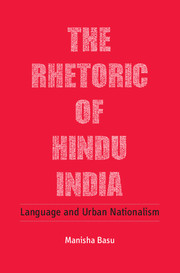Book contents
- Frontmatter
- Dedication
- Contents
- Preface
- 1 Introductory Matters: The Strange Case of Secular India
- 2 Time's Victims in a Second Republic: New Histories, New Temporalities
- 3 To Make Free and Let Die: The Economics of Metropolitan Hindutva
- 4 A Power over Life and Rebirth: V. D. Savarkar and the Essentials of Hindutva
- 5 Between Death and Redemption: Hindu India and its Antique Others
- 6 The After-Life of Indian Writing in English: Telematic Managers, Journalistic Mantras
- Bibliography
- Index
2 - Time's Victims in a Second Republic: New Histories, New Temporalities
Published online by Cambridge University Press: 23 July 2017
- Frontmatter
- Dedication
- Contents
- Preface
- 1 Introductory Matters: The Strange Case of Secular India
- 2 Time's Victims in a Second Republic: New Histories, New Temporalities
- 3 To Make Free and Let Die: The Economics of Metropolitan Hindutva
- 4 A Power over Life and Rebirth: V. D. Savarkar and the Essentials of Hindutva
- 5 Between Death and Redemption: Hindu India and its Antique Others
- 6 The After-Life of Indian Writing in English: Telematic Managers, Journalistic Mantras
- Bibliography
- Index
Summary
Martha Nussbaum's The Clash Within: Democracy, Religious Violence and India's Future (2007) is an important instance of scholarly attack on the emergence of Hindu fundamentalism in the context of a newly globalizing India. One of the significant aspects of this work is that Nussbaum does not just stop at condemning the duplicitous politics and violent excursions of Hindu supremacist organizations. Instead, she seeks to ask what exactly it is that has made metropolitan Hindutva so successful despite the contradictions in its discourse and the regular instances of heinous brutality that dog its political footsteps. Nussbaum's analysis is focused primarily on the years between 1998 and 2004, when the parliamentary structure of India was controlled to a significant degree by right-wing Hindu nationalist forces which sought to make ‘fundamental changes in India's pluralist democracy’ (Nussbaum, 2007,1). Led in government by the BJP and its allies, and aided by extra-parliamentary formations of similar ideological dispensation, the Hindu Right had been threatening, increasingly aggressively since the late 1980s and early 1990s, to dismantle independent India's strong espousal of secularism whose founding figure was Jawaharlal Nehru. One of the most grisly manifestations of this dangerous ideology was the genocidal cleansing of Muslim minorities in the western Indian state of Gujarat in February-March 2002 and not surprisingly, given the period of her focus, Nussbaum gears her attack towards this event. It was soon after this Gujrat pogrom that the political units associated with Hindutva suffered a shocking electoral loss, but alongside many other scholars, Nussbaum was perspicacious enough to remark that the Hindu right-wing impulse remained strong in the Indian polity despite the parliamentary setback of 2004. Of course we know that in the years since the publication of The Clash Within, the Hindu nationalist BJP has returned to power on the strength of a sweeping mandate. But more pointedly, we also know that the figure who spearheaded this triumph was none other than a man, who serving as the chief minister of Gujarat between 2001 and 2014, was associated most closely with the 2002 ethnic cleansing in that state.
- Type
- Chapter
- Information
- The Rhetoric of Hindu IndiaLanguage and Urban Nationalism, pp. 35 - 68Publisher: Cambridge University PressPrint publication year: 2016



